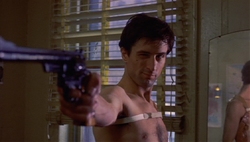Travis Bickle: Are you talking to me? I'm the only one here.

I believe we were given or perhaps created religion in order not be alone in an otherwise cold universe. It may have been biological. We have a gift for pattern-seeking. It's what gave our ancestors and ourselves the ability to distinguish between predator and prey, friend and foe. An entire region of the brain is devoted to just such an activity in order for us to recognize faces. If someone has a head injury with damage to that region, that person will be rendered incapable of recognizing any human face, be it their mother or even their own face in the mirror. Such is the powerful mechanism which allows us to see patterns even when they may be none. Perhaps religion is true and faith determines belief. I am unable to provide the answers, but I am able to best tell you what Italian Catholic film director Martin Scorsese has to say on the matter in relation to his 1976 film, Taxi Driver.
In Taxi Driver, the most famous, oft-repeated line is spoken by Robert De Niro to himself in a mirror. "Are you talking to me? I'm the only one here." When a character in a film looks in a mirror, there is something else going on. There is a duality, that battle between Heaven and Hell, good and evil and the battleground is within the character itself. Here is a character desperate to make any kind of human contact with any piece of humanity he sees cast adrift in the misty streets of New York city but he is unable to.
Perhaps the divine humanity bestowed upon them by any sort of creator is dying or dead and therefore they are unable to connect as well. They can not accept love because they have not seen it before and can not even recognize it within themselves.
Robert De Niro tests himself against the fires of Hell by burning himself over a flame in his apartment. There may not be an afterlife in Scorsese's vision. "We pay don't pay for our sins in church", he said in the opening of his earlier film Mean Streets. "We pay for it in the streets and everything else is bullshit and you know it." Instant Karma is going to get you.
We have all been in our own lonely depths. We've all been one or twice lost in a sea of uncaring faces too caught up in their own trevails to pay any attention to our own. Perhaps that is why we came up with religion. So we would somehow feel less alone in a lonely world. Travis Bickle shares a predicament also shared in the Bible, the Fruedian view of women as either virgins or whores. There is no space within this man's mind to perceive them in any other fashion.
In true classic hero fashion, he seeks out to save a 12 year old prostitute, brilliantly potrayed by Jodie Foster. The contrasting virgin in this film is the ice cold blonde, Cybil Sheppard. This film can be read as a series of failed attempts to reach out to another human being and failing miserably. At the end when no human touch is available, Travis Bickle goes on a destructive bloodbath. We are not meant to be alone. Human beings are social creatures that evolved in tribes. Leave us alone and we become depressed, suicidal or homicidal.
Travis asks Betsy, the ice queen for a movie date and ends up taking her to a triple X rated feature. She walks out halfway and in a film known for it's sudden acts of violence, the most painful chapter in the film is not any gun fight or even the final bloodbath in the brothel. The most painful scene in Taxi Driver hurts so bad that it has to happen off the screen.
In Scorsese films, camera movement reperesents power, ease of motion and acesss to any point of view in the space in front of it. The camera can only move if it has power, literally and figuratively. The only time the camera stops in the film is it's most painful moment that paralyses it in its tracks.
When Travis calls Betsy from a phone booth asking her out on a second date and the camera tracks around the room in a circle and stops facing an open doorway. Travis is behind the camera. On the soundtrack, you can hear the rejection take place. It's the Scorsese equivalent of Jesus asking his Father, why have you forsaken Me? It's a question we ask ourselves when we find our own love and affection unreturned. It makes our camera stop moving. It is enough to kill whatever is left of the divine in our hearts.
The sheer loneliness that is at the heart of our deepest fears of dying alone is also present in Taxi Driver. New York is shot at night bathed in Satan's red light and steam rises from the sewers like the river Styx. New York is a stand-in for Hell or a world without God. Travis Bickle is God's last lonely man, trying to salvage the divine spark within all of us by making a human connection but fails time and time.
The idea of an urban center as a stand-in for the corrupting forces of Hell and the damned is not new to Scorcese.
The Bible had Babylon, Sodom and Gommorah. Scorsese has New York City.
Paragraph.
